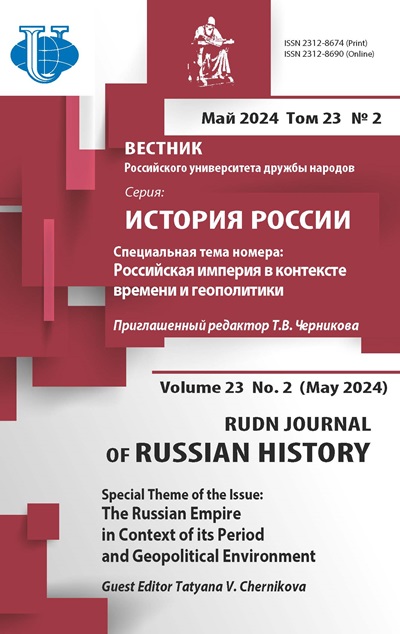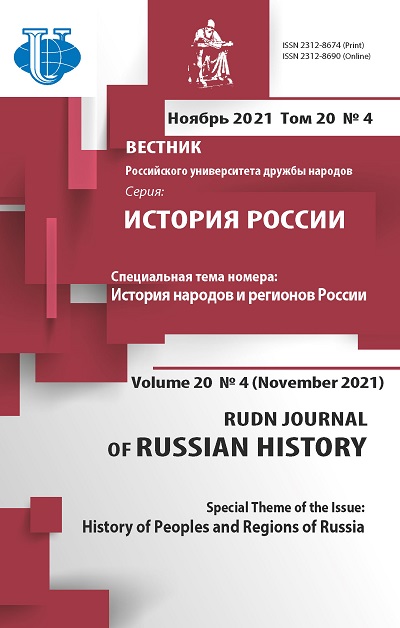The Nenets Autonomous Okrug in the system of Russian federalism: an ethno-sociological investigation
- Authors: Zorin V.Y.1, Kamenskikh M.S.2,3
-
Affiliations:
- Institute of Ethnology and Anthropology of the Russian Academy of Sciences
- Perm Scientific Center, Ural Branch of the Russian Academy of Sciences
- Perm State National Research Polytechnic University
- Issue: Vol 20, No 4 (2021): History of Peoples and Regions of Russia
- Pages: 568-578
- Section: HISTORY OF PEOPLES AND REGIONS OF RUSSIA
- URL: https://journals.rudn.ru/russian-history/article/view/29573
- DOI: https://doi.org/10.22363/2312-8674-2021-20-4-568-578
Cite item
Full text / tables, figures
Abstract
The article is devoted to the analysis of trends in the development of modern Russian federalism, against the background the discussions about a possible merger of the Nenets Autonomous Okrug (NAO) and the Arkhangelsk Region. These discussions caused mass protests among the residents of the Nenets Autonomous Okrug. In 1993, the NAO was proclaimed as an equal subject of the Russian Federation. However, the Okrug’s historical dependence on the Arkhangelsk Region in terms of transport and energy caused difficult relations between the two regions over the past 30 years. In this regard, the situation in the Okrug is of interest from the standpoint of analyzing trends in the development of Russian federalism. In 2020, the situation around the NAO and the Arkhangelsk Region came back on the agenda after the announcement of the upcoming merger of the subjects. Mass protests, and the refusal of the majority of the district's population to support the amendments to the Constitution of the Russian Federation, suspended the process of regional integration. The main source of the study are data won from an ethno-sociological study conducted in the district in 2020. The study included questionnaires, focus groups and in-depth interview recordings. The material shows that despite the decision, the population of the district and public opinion leaders find an integration of the district and the Arkhangelsk region into one subject inacceptable. Moreover, the idea is perceived by many people as a threat, “an attempt to conquer, invade.” The participants of the survey give a negative assessment of the actions of the Arkhangelsk region authorities and support representatives of the district authorities that are against the integration. At the same time, the residents of the Okrug share the values of civil Russian identity and are ready to dialogue and compromises. The authors suppose that now it is essential to develop a flexible strategy and take into consideration the situation that has emerged recently. In the short term, it is necessary to involve broad strata of public opinion leaders in discussion and cooperation, study their sentiments, and take their position into account when studying the feasibility of new regions. It is necessary to involve the expert community in the development of the strategy.
About the authors
Vladimir Yu. Zorin
Institute of Ethnology and Anthropology of the Russian Academy of Sciences
Email: v.y.zorin@mail.ru
Dr. Habil. Politics, Professor, Chief researcher
119991, Россия, Москва, Ленинский проспект, 32аMikhail S. Kamenskikh
Perm Scientific Center, Ural Branch of the Russian Academy of Sciences; Perm State National Research Polytechnic University
Author for correspondence.
Email: pomidorrr@mail.ru
Ph.D. in History, Senior Researcher of the Department of History, Archeology and Ethnography, Perm Scientific Center, Ural Branch of the Russian Academy of Sciences; Associate Professor of the Department of Foreign Languages, Linguistics and Translation, Perm National Research Polytechnic University
13а, Lenina St., Perm, 614990, Russia; 29, Komsomolskiy Ave., Perm, 614099, RussiaReferences
- Artobolevsky, S.S., Vendina, O.I., Gontmakher, E.Sh., Zubarevich, N.V., and Kynev, A.V. Ob"yedineniie sub"yektov Rossiyskoi Federatsii: za i protiv. Moscow: Insor Publ., 2010 (in Russian)
- Cheshko, S.V. Raspad SSSR: etnopoliticheskii analiz. Moscow: IEA RAS Publ., 2000 (in Russian)
- Filatov, S.B, Lunkin, RN, and Dennen, K. “Arkhangel'skaya oblast' i Nenetskii avtonomnyy okrug.” In Religious and social life of Russian regions, 141-194. Moscow: Summer Garden Publ., 2014 (in Russian)
- Okunev, I.Yu., Oskolkov, P.V., and Tislenko, M.I. et al., eds. Ob"yedineniye regionov Rossiyskoy Federatsii: sotsiologicheskiye dannyye, glubinnyye interv'yu, sravnitel'nyy analiz: Monografiya. Moscow: Aspect Press Publ., 2019 (in Russian)
- Putin, V.V. “Rossia: Natsionalnyi vopros.” Nezavisimaya gazeta, January, 23, 2012, (in Russian)
- Shabaev, Yu.P. “Nenetskiy avtonomnyy okrug.” Narody Severa Rossii: obychai, traditsii, kul'tura. Moscow: Knorus Publ., 2017 (in Russian)
- Yashin, N.A. “O prakticheskikh aspektakh obrazovaniya novogo sub"yekta RFvrezul'tate ob"yedineniya Permskoy oblasti i Komi-Permyatskogo avtonomnogo okruga.” Issue 2 of: Ob"yedinenie Permskoi oblasti i Komi-Permiatskogo avtonomnogo okruga. Sbornik dokumentov. Informatsionnii normativno-metodicheskii byulleten' po voprosam politicheskoi i pravovoi kul'tury. Perm: Permskoye knizhnoe izdatel'stvo Publ., 2004 (in Russian)
- Zorin, V.Yu. “Chto khoteli zhiteli NAO skazat' protestnym golosovaniyem po Konstitutsii Rossii.” IA Regnum, Accessed June 10, 2021, https://regnum.ru/news/polit/3007947.html (in Russian)
















